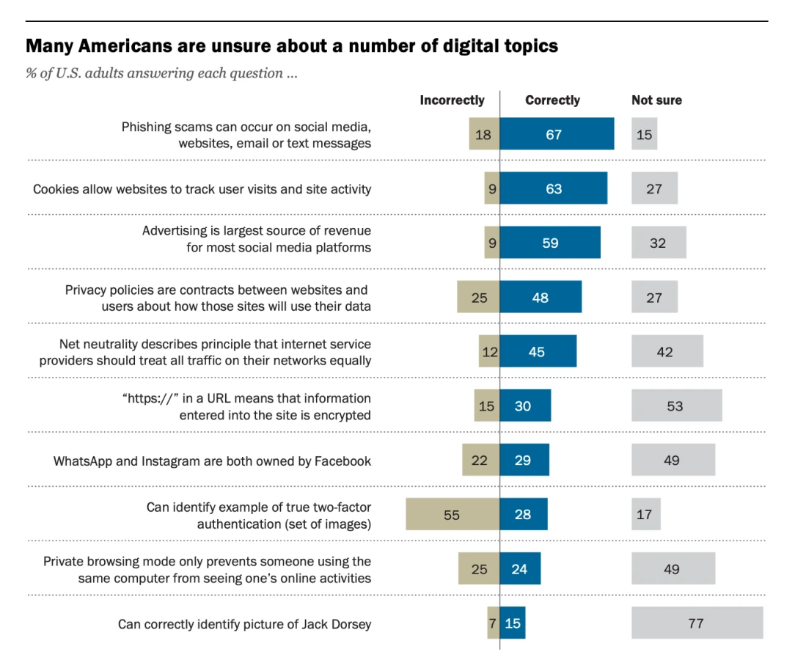Pew Survey: Almost Half Don't Know Ads Power Free Social Media
The smarter way to stay on top of the multichannel video marketplace. Sign up below.
You are now subscribed
Your newsletter sign-up was successful
Social media sites under fire from Washington for targeted advertising data collection apparently need to do a better job or letting Web users know how important those ads are to the free Web content they have come to treat as something of a digital birthright.
According to a new Pew Research survey, only 59% of respondents knew that advertising was the biggest source of revenue for most social media platforms, rather than, say, exclusive licensing deals.

That was just one of the findings from a 10-question digital knowledge "quiz" Pew gave to 4,272 adults, which Pew was billing as showing "a majority of U.S. adults can answer fewer than half the questions correctly on a digital knowledge quiz, and many struggle with key cybersecurity and privacy questions."
Clearly by Pew's measure they struggled.
Some eight out of 10 respondents got only 60% or fewer of the questions right, a failing grade--or at least a D-minus-minus--in most schools. In fact, the 59% that did know ads fueled web content was among the top percentage-getters, with only three questions answered correctly by even half the respondents (63% knew that cookies are text files that allow web sites to track user's visits and a whopping 67% knew that phishing scams can happen across multiple platforms.
Among the other takeaways: Only about half (48%) "correctly answered that a privacy policy is a contract between websites and users regarding how their data will be used" and only 30% knew that an https://url means it is encrypted.
The "struggle" might not be all about lack of knowledge, however. Theoretically someone might think a privacy policy is a notification of terms of service and not know necessarily a binding "contract." For example, this Fordham Intellectual Property, Media and Entertainment Law Journal holds that "website privacy policies...are generally not considered to be legally binding agreements."
The smarter way to stay on top of the multichannel video marketplace. Sign up below.
And at least one of the questions might have appeared to need more nuanced, "explain your answer" answers than "yes" or "no."
"Net Neutrality describes principle that internet service providers should treat all traffic on their networks equally," was the question, with 45% saying that was correct. Some would, and have, argued that net neutrality means not discriminating against content for anti-competitive or political reasons and does not mean, say, treating cat videos the same as 911 calls.
So, it might not be a case of knowing or not knowing, but interpreting the question differently, with even the politics of the respondent coming into play.
There was also a question asking respondents to identify a picture of Twitter CEO Jack Dorsey, which is arguably more about cultural literacy poor news consumption than digital knowledge per se.
The quiz/survey was conducted conducted June 3-17, 2019. The margin of error is plus or minus 1.9 percentage points.
Contributing editor John Eggerton has been an editor and/or writer on media regulation, legislation and policy for over four decades, including covering the FCC, FTC, Congress, the major media trade associations, and the federal courts. In addition to Multichannel News and Broadcasting + Cable, his work has appeared in Radio World, TV Technology, TV Fax, This Week in Consumer Electronics, Variety and the Encyclopedia Britannica.

